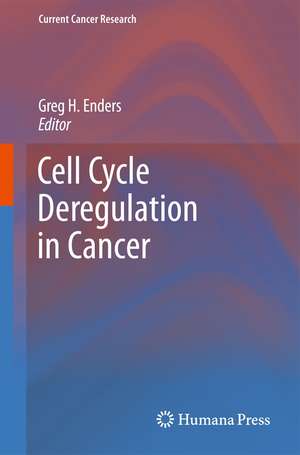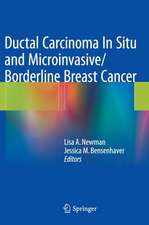Cell Cycle Deregulation in Cancer: Current Cancer Research
Editat de Greg H. Endersen Limba Engleză Paperback – 4 mai 2012
| Toate formatele și edițiile | Preț | Express |
|---|---|---|
| Paperback (1) | 1089.85 lei 6-8 săpt. | |
| Springer – 4 mai 2012 | 1089.85 lei 6-8 săpt. | |
| Hardback (1) | 1094.80 lei 6-8 săpt. | |
| Springer – 22 mar 2010 | 1094.80 lei 6-8 săpt. |
Din seria Current Cancer Research
- 5%
 Preț: 1132.09 lei
Preț: 1132.09 lei - 5%
 Preț: 1609.56 lei
Preț: 1609.56 lei - 5%
 Preț: 728.68 lei
Preț: 728.68 lei - 5%
 Preț: 1421.21 lei
Preț: 1421.21 lei - 5%
 Preț: 1094.08 lei
Preț: 1094.08 lei - 5%
 Preț: 1481.57 lei
Preț: 1481.57 lei - 5%
 Preț: 1094.80 lei
Preț: 1094.80 lei - 5%
 Preț: 1447.73 lei
Preț: 1447.73 lei - 5%
 Preț: 706.97 lei
Preț: 706.97 lei - 5%
 Preț: 1096.81 lei
Preț: 1096.81 lei - 5%
 Preț: 1098.48 lei
Preț: 1098.48 lei - 5%
 Preț: 1112.17 lei
Preț: 1112.17 lei - 5%
 Preț: 714.63 lei
Preț: 714.63 lei - 5%
 Preț: 1297.22 lei
Preț: 1297.22 lei - 5%
 Preț: 1100.64 lei
Preț: 1100.64 lei - 5%
 Preț: 1103.95 lei
Preț: 1103.95 lei - 5%
 Preț: 715.35 lei
Preț: 715.35 lei - 5%
 Preț: 1171.03 lei
Preț: 1171.03 lei - 5%
 Preț: 902.44 lei
Preț: 902.44 lei - 5%
 Preț: 1608.47 lei
Preț: 1608.47 lei - 5%
 Preț: 1438.78 lei
Preț: 1438.78 lei
Preț: 1089.85 lei
Preț vechi: 1147.21 lei
-5% Nou
Puncte Express: 1635
Preț estimativ în valută:
208.55€ • 223.00$ • 173.88£
208.55€ • 223.00$ • 173.88£
Carte tipărită la comandă
Livrare economică 17 aprilie-01 mai
Preluare comenzi: 021 569.72.76
Specificații
ISBN-13: 9781461425694
ISBN-10: 1461425697
Pagini: 216
Ilustrații: VIII, 206 p. 19 illus., 11 illus. in color.
Dimensiuni: 155 x 235 x 11 mm
Greutate: 0.31 kg
Ediția:2010
Editura: Springer
Colecția Springer
Seria Current Cancer Research
Locul publicării:New York, NY, United States
ISBN-10: 1461425697
Pagini: 216
Ilustrații: VIII, 206 p. 19 illus., 11 illus. in color.
Dimensiuni: 155 x 235 x 11 mm
Greutate: 0.31 kg
Ediția:2010
Editura: Springer
Colecția Springer
Seria Current Cancer Research
Locul publicării:New York, NY, United States
Public țintă
ResearchCuprins
Starting the Cell Division Cycle.- Escape from Cellular Quiescence.- Interplay Between Cyclin-Dependent Kinases and E2F-Dependent Transcription.- Regulation of Pre-RC Assembly: A Complex Symphony Orchestrated by CDKs.- Proliferation Under Duress.- Mitotic Checkpoint and Chromosome Instability in Cancer.- Mitotic Catastrophe.- p53, ARF, and the Control of Autophagy.- Long-Term Proliferation.- Regulation of Self-Renewing Divisions in Normal and Leukaemia Stem Cells.- Maintenance of Telomeres in Cancer.- The Senescence Secretome and Its Impact on Tumor Suppression and Cancer.- Applications in Preventing and Treating Cancer.- Cell Cycle Deregulation in Pre-neoplasia: Case Study of Barrett’s Oesophagus.- Targeting Cyclin-Dependent Kinases for Cancer Therapy.
Textul de pe ultima copertă
Modern studies of regulation of the cell division cycle were pioneered by Leland Hartwell, Paul Nurse, and Tim Hunt in yeast and marine invertebrates. This work identified proteins termed cyclins that fluxuate in abundance during progression through the cycle and partner with Cyclin dependent kinases (Cdks) to drive major cell cycle transitions. Much has been learned since about how these and other proteins control cell cycle progression in all eukaryotes, including man. Further research is uncovering how these controls are de-regulated in cancer, a disease of unbridled cell proliferation that is the leading cause of death in developed countries. However, there is much more to be learned, and the hard won gains are just beginning to impact cancer care. In 11 reviews by leading experts, this volume lays out the current state and directions of the field for biomedical scientists of all training levels.
The collection begins with three reviews that delineate how cells initiate the cell cycle, from growth factor stimulation to activation of key transcription programs and origins of DNA replication. The next three reviews address issues of proliferation under duress, including how derangement of mitotic checkpoints can lead to cell death or genetic instability and how recycling of intracellular molecules (autophagy) is regulated. The next three reviews address the special context of long-term proliferation—how it is regulated in stem cells, how it can erode telomeric structures on the tips of chromosomes, and how it can culminate in senescence. The last two reviews describe how cell cycle advances are beginning to touch patients, in the characterization of pre-malignant states and in cancer therapy.
The collection begins with three reviews that delineate how cells initiate the cell cycle, from growth factor stimulation to activation of key transcription programs and origins of DNA replication. The next three reviews address issues of proliferation under duress, including how derangement of mitotic checkpoints can lead to cell death or genetic instability and how recycling of intracellular molecules (autophagy) is regulated. The next three reviews address the special context of long-term proliferation—how it is regulated in stem cells, how it can erode telomeric structures on the tips of chromosomes, and how it can culminate in senescence. The last two reviews describe how cell cycle advances are beginning to touch patients, in the characterization of pre-malignant states and in cancer therapy.
Caracteristici
outlines major cell cycle perturbations that drive tumorigenesis and considers the prospects for using such knowledge in cancer therapy. Includes supplementary material: sn.pub/extras










